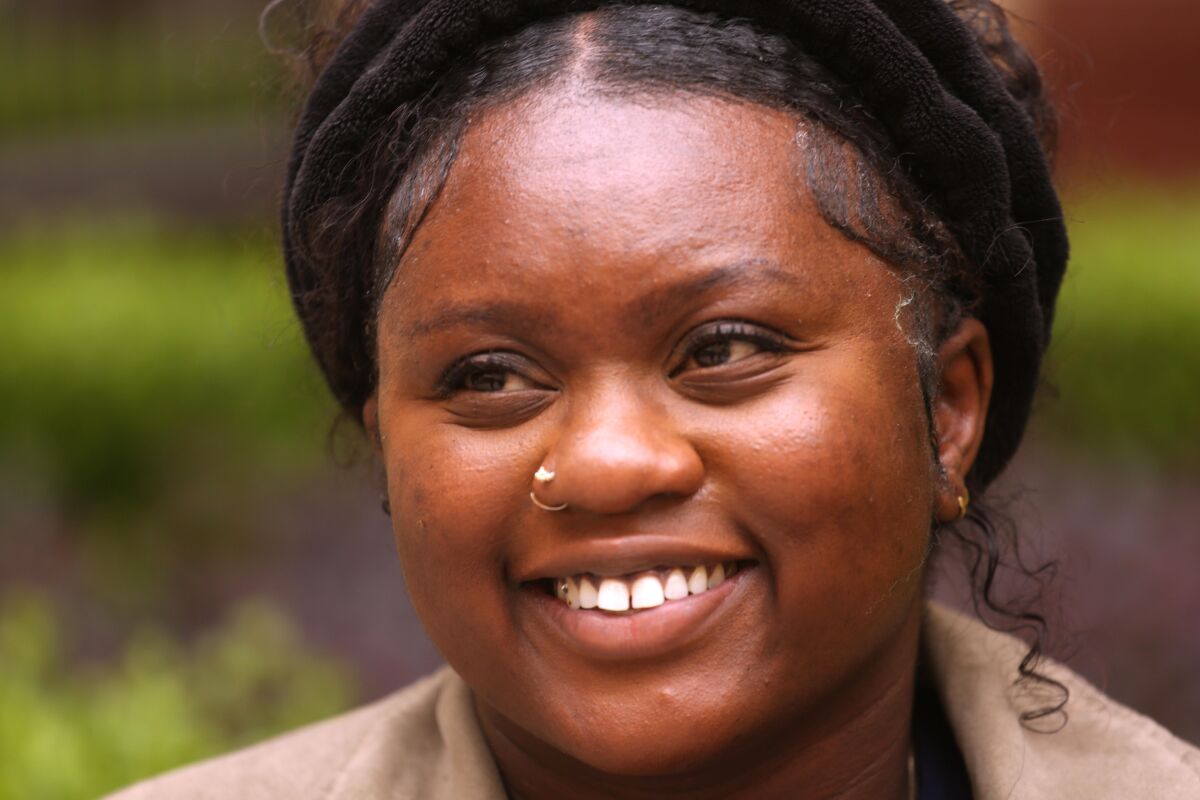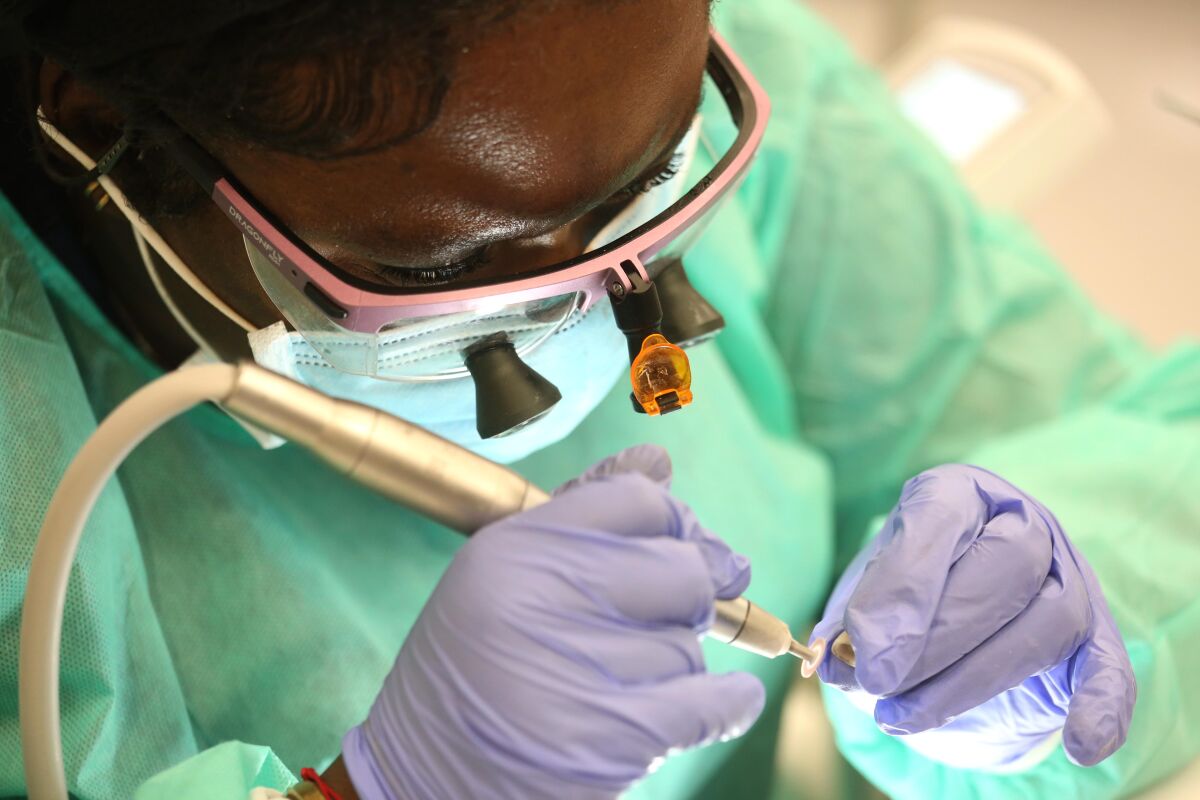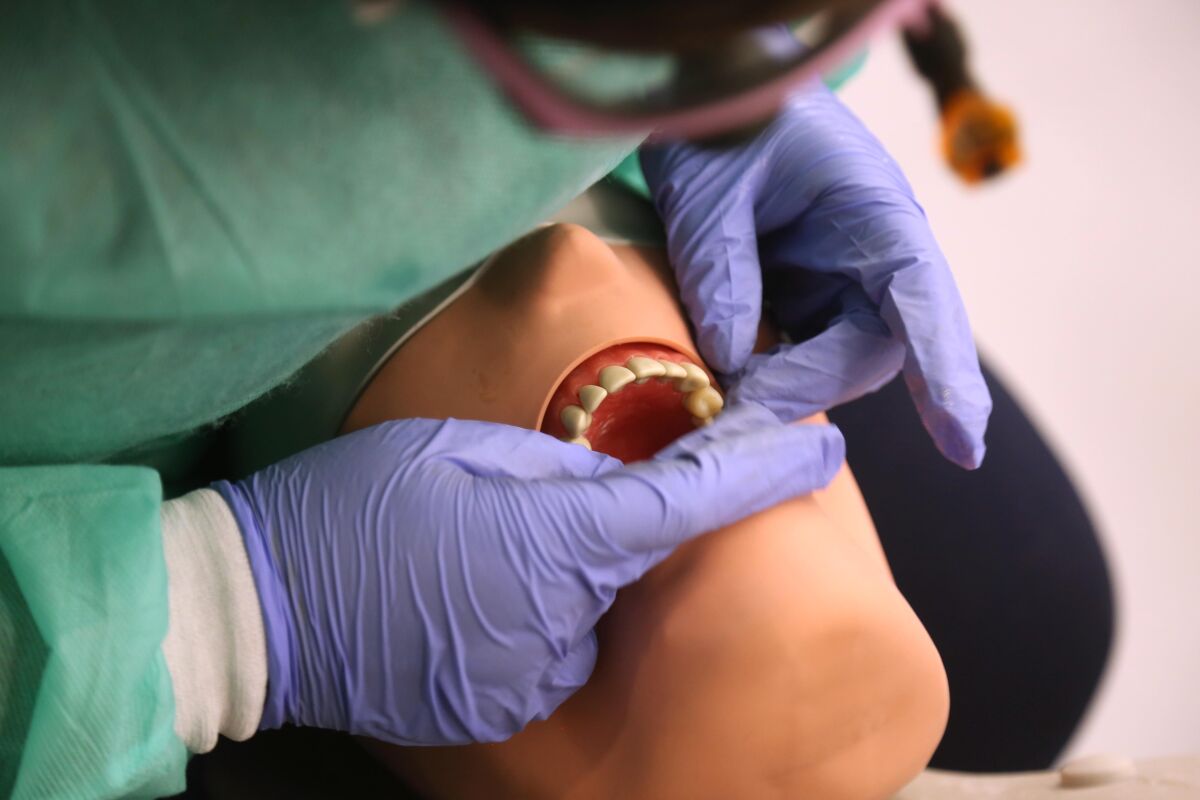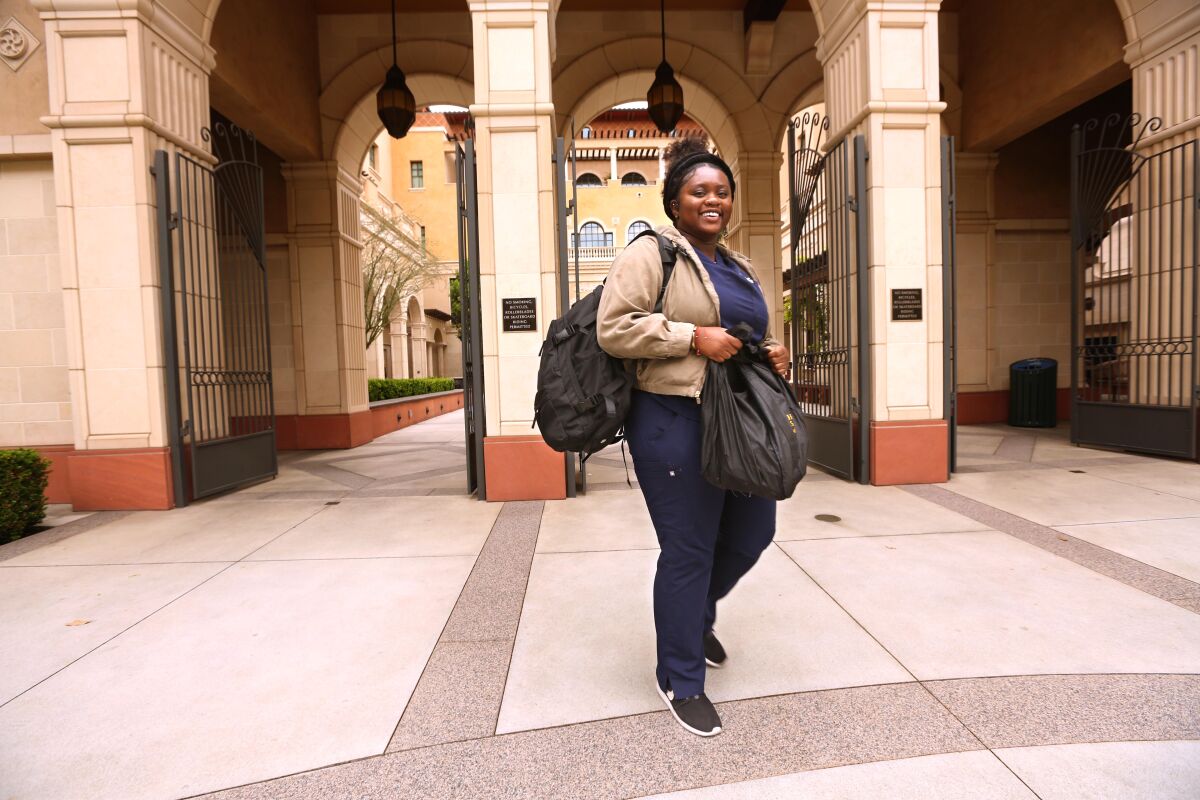As a child raised by a single mother, Somkene Okwuego got her dental work done at a USC clinic that serves patients regardless of financial circumstances. Last week, I met with her in that same building, where the 23-year-old is finishing her first year at the Herman Ostrow School of Dentistry.
With full concentration, Okwuego sanded and buffed a temporary crown she was making in a lab where dozens of students trained on mannequin heads with full sets of teeth.
The patients are dummies; the students are whizzes.
The four-hour lab was coming to a close, and professor Daniel Tevrizian came by to check Okwuego’s work.
“She’s got good hand skill,” Tevrizian told me as he made a few recommendations to Okwuego and demonstrated how to fine-tune the crown for a perfect fit. “She’s a good listener. She follows up on what she’s been told.”
Several months ago, Paul Irving, a scholar-in-residence at USC’s Leonard Davis School of Gerontology, advised me to consider the role of young people in addressing the needs of the world’s rapidly aging population, from housing to healthcare and beyond.
It was good advice, and when I heard that Okwuego wants to specialize in geriatric dentistry, I reached out to her.
Okwuego’s resume of jobs, internships and volunteering would take up this entire column, so I’m going to have to skim the highlights.
She was student body president at her Los Angeles Unified high school, the USC Media Arts & Engineering Magnet; she worked as a volunteer greeter at a Kaiser Permanente facility; she mentored younger students at the 24th Street Theatre; she drove older patients to medical appointments for a Westside nonprofit.

Somkene Okwuego, 23, is optimistic about her future while studying at the Herman Ostrow School of Dentistry at USC. Okwuego is trying to answer a growing need — healthcare for an aging population.
(Genaro Molina / Los Angeles Times)
At the moment, in addition to the demands of dental school, she works on occasion in the dental office of a Skid Row homeless service center. And she’s a part-time teaching assistant for a former gerontology professor, John Walsh, who became a mentor.
I mentioned that at her age, I was an accomplished slacker. Okwuego smiled and told me she’s considering taking another job.
What now?
She’s a certified nurse assistant, she said, and used to work at a nursing facility. They’ve asked her back, and she might try to squeeze in one day a week.
At various times in her earlier years, Okwuego wanted to be an artist, an engineer, a film editor, a heart surgeon and an anesthesiologist. She also wants to become fluent in Korean, a work in progress.

Somkene Okwuego makes a crown during a class at USC’s Herman Ostrow School of Dentistry of USC.
(Genaro Molina / Los Angeles Times)
Her role models include her grandfather, a doctor in Nigeria, and her aunt, a dentist in Maryland. And then there was her grandmother, Victoria, who was moving from Nigeria to Los Angeles several years ago, suffered a stroke on the plane, and spent her last years in nursing facilities. “I’d go to high school, then go straight to the facility,” said Okwuego, who got to know the nursing staff while visiting her grandmother.
She traded shifts with relatives, including her mother, who was college-educated in Nigeria and works in L.A. as a compliance officer.
“We were there every day and made sure she got all her speech therapy and physical therapies,” said Okwuego.
While still in high school, Okwuego took a college-credit summer course in neuroscience. It was taught by Walsh, who was as impressed with her as she was with him.
“She was amazing,” said Walsh, who spoke to me by phone from Costa Rica, where he’s leading USC students in a project studying the factors involved in longer lifespans in one particular community. (The short answer: a tight-knit community of shared interests, healthy farm-to-table eating habits, and exercise done in the course of work and other daily routines, rather than on gymnasium treadmills.)

Somkene Okwuego inserts a crown on a mock patient during a dentistry class at USC’s Herman Ostrow School of Dentistry.
(Genaro Molina / Los Angeles Times)
Walsh saw Okwuego as a good candidate for USC’s gerontology school, and he admired her desire to seek out a career in the underserved South L.A. community she lives in.
“I loved her drive so much, and her quest for knowledge,” said Walsh, a popular teacher not just for the depth of his knowledge on aging-related disease, but also on fitness and proper nutrition as preventive measures. He’s a lifelong surfer who’s been known to begin gerontology classes with group stretching.
Okwuego said the summer class “beat me up the first week,” and she told Walsh she wasn’t sure she was cut out for science. But she settled in and found the field not just fascinating, but personally relevant.
“I got what my grandmother was going through on a deeper level,” she said, and she became interested in the dynamics of dementia and other age-related diseases.
Okwuego won a scholarship to USC’s gerontology school, where she earned both bachelor’s and master’s degrees in just four years.
Of course.
Along the way, she says, she convinced two friends who weren’t happy in their majors to switch to gerontology.
“There are so many aspects to it,” Okwuego said. “We’re all aging every day, and there’s something so humanistic to it. It’s a perfect way to blend science and empathy.”
It can be difficult to interest an incoming college student in gerontology, Walsh said, because it’s a time in life when aging is not on the radar. But Maria Henke, an associate dean, said USC’s gerontology program is the largest in the country, and that countless career tracks are available to the school’s graduates, whether they go into healthcare, academic research, law, housing, technology, financial management, senior living or government.

Somkene Okwuego helped care for her ailing grandmother, then drove patients to doctor’s appointments while in high school, before graduating from the Leonard Davis School of Gerontology at USC. She is now in dental school, with the goal of performing geriatric dentistry in South Central, where she grew up.
(Genaro Molina / Los Angeles Times)
“There are so many things we have to do” to prepare for a world in which older adults will soon outnumber younger adults, said Henke, who’s on the board of the American Society on Aging. “And gerontology is a good foundation.”
All dentists can treat older adults, said Piedad Suarez, a USC professor, gerontologist and dentist. But those with geriatric training “can be better providers,” she said, in the same manner in which pediatric dentists cater to the needs of youngsters.
USC announced in January that Okwuego was one of three USC students awarded a National Health Service Corps scholarship that covers dental school costs and requires a two-year commitment to work in an area with a shortage of healthcare access. She told me she’s had friends who went years without visiting a dentist.
After making a crown in her lab class the other day, Okwuego sat on a bench near the dentistry school and reflected on her grandmother. The first time she saw her after the stroke, her grandmother was unable to speak “and her face was drooped.”
Okwuego was not quite 18 when her grandmother died. She said she later learned in gerontology school how “brains work differently” after an experience like the one her grandmother had endured.
“We noticed that music was something she was very responsive to. Her sister helped bring that out because her sister was … her best friend,” Okwuego said. “She lives in London and she flew out here and would sing church music from when they were growing up.”
Her grandmother still couldn’t speak, Okwuego said, but miraculously, she was able to sing.
“It was so beautiful.”
steve.lopez@latimes.com
This story originally appeared on LA Times

